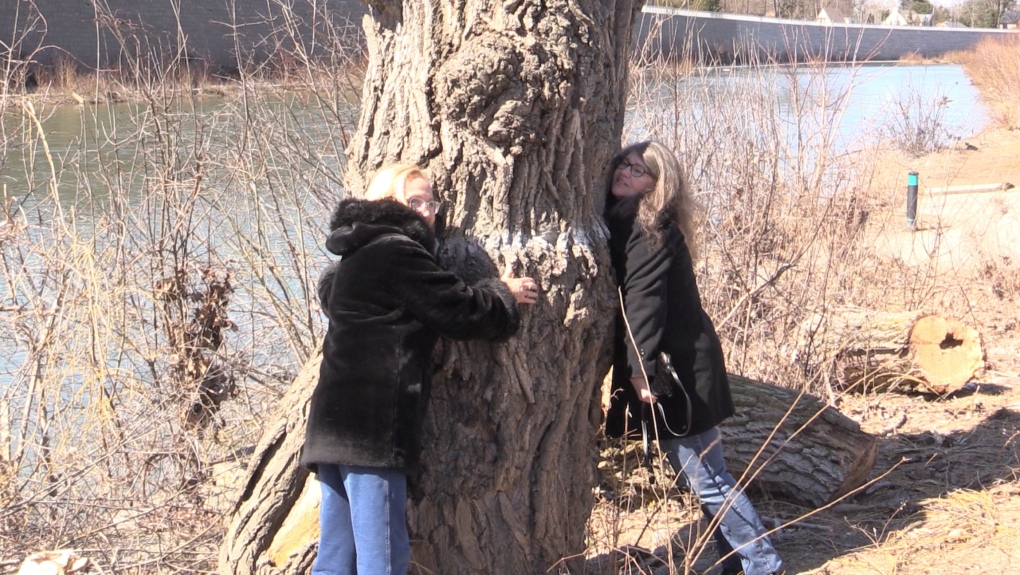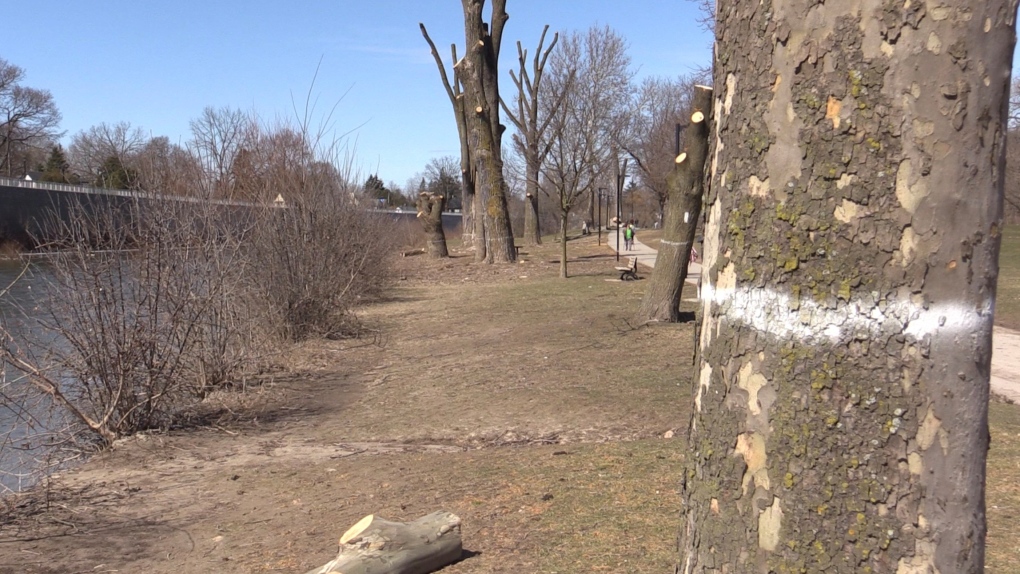'It’s a tragedy': Climate activist wants Harris Park trees saved, but city going ahead with erosion project
A university climate activist held a small protest Sunday at Harris Park, in hopes of saving centuries-old trees in downtown London, Ont.
“It’s really a tragedy to me,” said Genevieve Langille, a Western University student. “These are trees I grew up around, climbing on, and playing on. It's just really sad.”
The City of London originally had planned to remove 29 trees as part of the Harris Park Shoreline Restoration and Park Improvements project.
“We are taking them down because we do have some major work to do along the banks of the Thames and Harris Park for shoreline erosion mitigation,” said Shawn Lewis, London deputy mayor. “We're protecting the entire flow of the Thames and the access to Harris Park. So they have to come down because the work has to be done.”
Langille agrees that re-doing the shoreline is important, but feels that the tree cutting was not necessary.
“You could definitely do construction around them,” said Langille. “There's a long report with all the assessments including by an arborist and 20 of the trees are in fairly good condition that are being cut down. So those 20 weren’t in the way, really you could have done the project around them.”
 Protesters hug one of the mature trees at Harris Park on March 24, 2024. (Brent Lale/CTV News London)
Protesters hug one of the mature trees at Harris Park on March 24, 2024. (Brent Lale/CTV News London)
After Ward 13 Coun. David Ferreira walked along the banks of the Thames River with city staff last month to see if any trees could be saved, they identified a way to adjust the project.
“We were able to identify a way to adjust the path, and return up to four trees, which is confirmed with a possibility of one or two more,” said Ferreira.
The city added it will be replacing the trees with 89 additional trees.
“Yes, they will be smaller trees of course,” said Lewis. “Trees have a lifecycle just like human beings do, just like any living thing does. They will grow and mature over time and provide a great canopy in the future.”
Among those rallying alongside Langille was classmate Arthur Mustard-Thompson. He has long admired the trees along the banks of the Thames.
“They're just so large, these ancient trees, and I was just so concerned that they're being removed,” said Mustard-Thompson, who admitted it is too late to make much change, as many of the trees have been chopped at this point.
 24 trees are marked to be cut down at Harris Park, seen on March 24, 2024, as part of the Harris Park Shoreline Restoration and Park Improvements project. (Brent Lale/CTV News London)
24 trees are marked to be cut down at Harris Park, seen on March 24, 2024, as part of the Harris Park Shoreline Restoration and Park Improvements project. (Brent Lale/CTV News London)
He continued, “I think that the beauty of this park is that there weren't as many trees which is kind of an interesting perspective. But I think that having less trees in this park made these giant trees stand out more. So I think that packing this park’s full of trees, it will lose that effect.”
Lewis sympathized with the protesters, but said the city “doesn’t just cut down trees for no reason.”
“We need to start replacing some of the erosion mitigation measures,” said Lewis. “The cages with the rocks in them that are used to protect the banks of the Thames the way it is now, we will be in far worse shape in terms of flooding, in terms of species at risk, habitat loss, and in terms of even the welfare of the trees that are remaining. So we've got to do this work and unfortunately, the trees have to come down in order to make that happen.”
Langille expressed frustration, saying that across the city, projects have cut down trees and not replaced them despite saying they would.
“All the places where they said they're going to replace them often are not replaced to the same extent and to the same growth,” said Langille. “It's just really disappointing to me, and it's a huge tragedy. If you're planning on replacing trees, you should do it properly.”
CTVNews.ca Top Stories

More than 115 cases of eye damage reported in Ontario after solar eclipse
More than 115 people who viewed the solar eclipse in Ontario earlier this month experienced eye damage after the event, according to eye doctors in the province.
Toxic testing standoff: Family leaves house over air quality
A Sherwood Park family says their new house is uninhabitable. The McNaughton's say they were forced to leave the house after living there for only a week because contaminants inside made it difficult to breathe.
Decoy bear used to catch man who illegally killed a grizzly, B.C. conservation officers say
A man has been handed a lengthy hunting ban and fined thousands of dollars for illegally killing a grizzly bear, B.C. conservation officers say.
B.C. seeks ban on public drug use, dialing back decriminalization
The B.C. NDP has asked the federal government to recriminalize public drug use, marking a major shift in the province's approach to addressing the deadly overdose crisis.
OPP responds to apparent video of officer supporting anti-Trudeau government protestors
The Ontario Provincial Police (OPP) says it's investigating an interaction between a uniformed officer and anti-Trudeau government protestors after a video circulated on social media.
An emergency slide falls off a Delta Air Lines plane, forcing pilots to return to JFK in New York
An emergency slide fell off a Delta Air Lines jetliner shortly after takeoff Friday from New York, and pilots who felt a vibration in the plane circled back to land safely at JFK Airport.
Sophie Gregoire Trudeau on navigating post-political life, co-parenting and freedom
Sophie Gregoire Trudeau says there is 'still so much love' between her and Prime Minister Justin Trudeau, as they navigate their post-separation relationship co-parenting their three children.
Last letters of pioneering climber who died on Everest reveal dark side of mountaineering
George Mallory is renowned for being one of the first British mountaineers to attempt to scale the dizzying heights of Mount Everest during the 1920s. Nearly a century later, newly digitized letters shed light on Mallory’s hopes and fears about ascending Everest.
Loud boom in Hamilton caused by propane tank, police say
A loud explosion was heard across Hamilton on Friday after a propane tank was accidentally destroyed and detonated at a local scrap metal yard, police say.































